This Conversation Is Over
When it comes to AI-powered shopping, dialogue only gets in the way.

They want you to feel checked out.
I’m in the market for a new messenger bag, so last week, I thought I’d give AI tools a whirl to find my next one. What I saw surprised me a little. It turns out that ChatGPT has quietly rolled out a whole shopping experience. I think it’s a big deal, but in some ways, it’s also a return to normal for how we use LLM technology online.
Here’s my prompt: “I’ve got a Timbuk2 black messenger bag but I need something bigger with more pockets. What matters: Waterproof, bike-friendly, black, and professional.”
We’re going to prompt ChatGPT, Perplexity, Claude, and Google. I have paid subscriptions for everything, although the AI Mode in Google is free. The results:
Want more of this?
The Aboard Newsletter from Paul Ford and Rich Ziade: Weekly insights, emerging trends, and tips on how to navigate the world of AI, software, and your career. Every week, totally free, right in your inbox.
OpenAI’s ChatGPT using its MacOS desktop app “thought” for 50 seconds and created a very good dossier on messenger bags. It found 11 likely matches and assembled them into a wide, scrollable module, and when I clicked on a given image, a “detail” view appeared, with multiple photos, specs, and pricing. The response also included an ordered list of suggestions for different use cases (“Best laptop-forward messenger”; “Minimalist, sleek look”; and so forth), and a guide on “How to decide.” It’s interesting to note that OpenAI is proactively seeking out partnerships with vendors—Etsy just announced one.
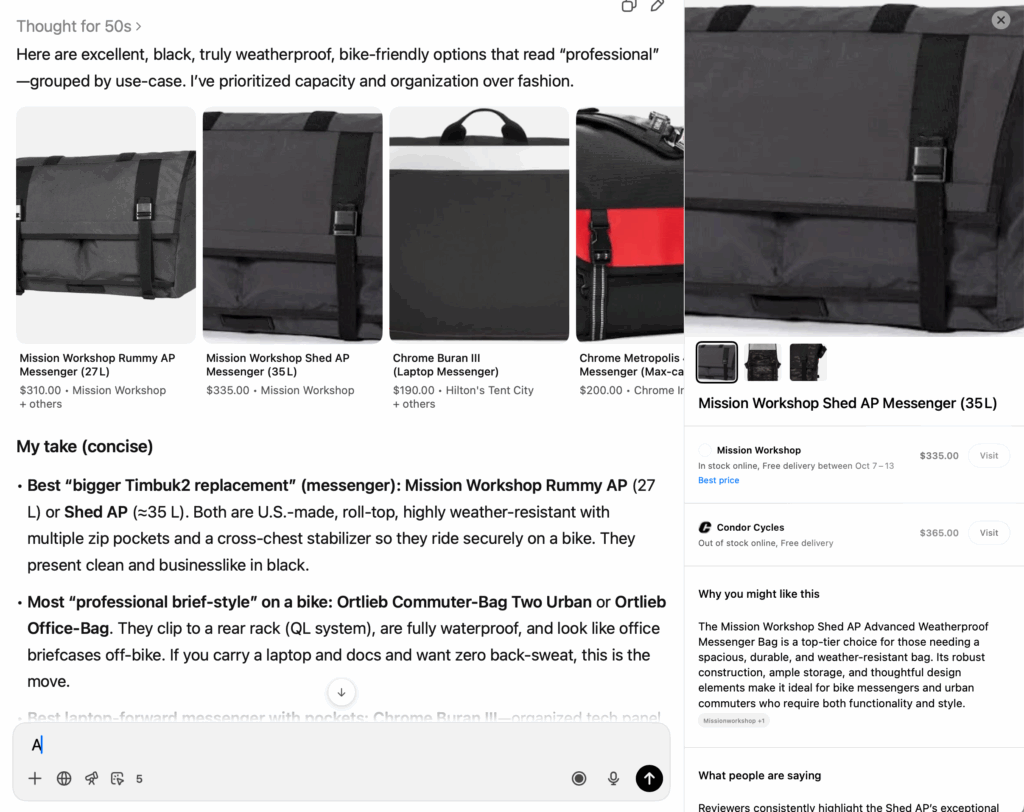
Perplexity via their browser Comet took about 10 seconds. It produced mostly text and links to summaries and roundups from the web—meaning it pointed to editorial content, not directly to product pages. Then it wrote up a summary with recommendations, with a few specific recommendations around things like “extra hauling capacity.” The content was typical LLM output. Basically, it felt like “AI-enhanced search” rather than a shopping experience.
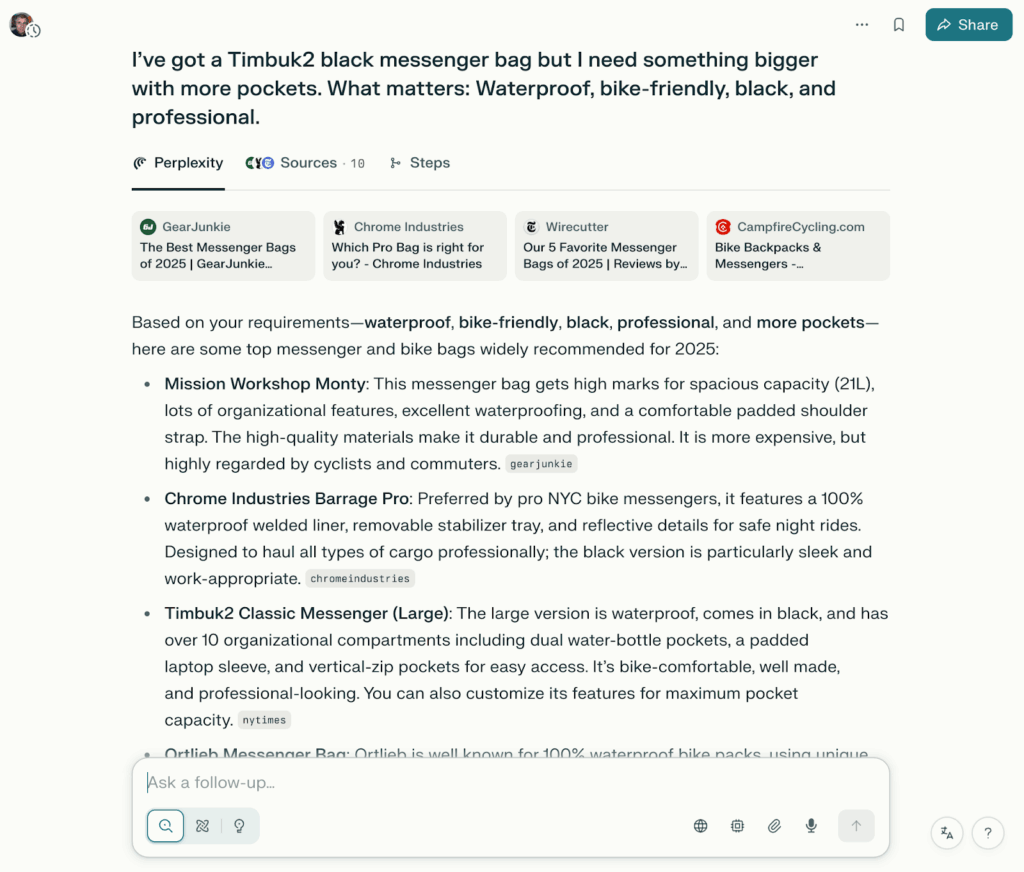
I remembered that Perplexity has a “Shopping” mode (it didn’t remind me), so I gave that a try. Switching to “Shopping” and pasting that prompt produced similar, textual results. So I tried a simple search: “Messenger bag,” which produced catalog-style, visual results, but also seemed to recall my earlier search (“Here are several messenger bags that meet your criteria of being large, black, waterproof or water-resistant…”)
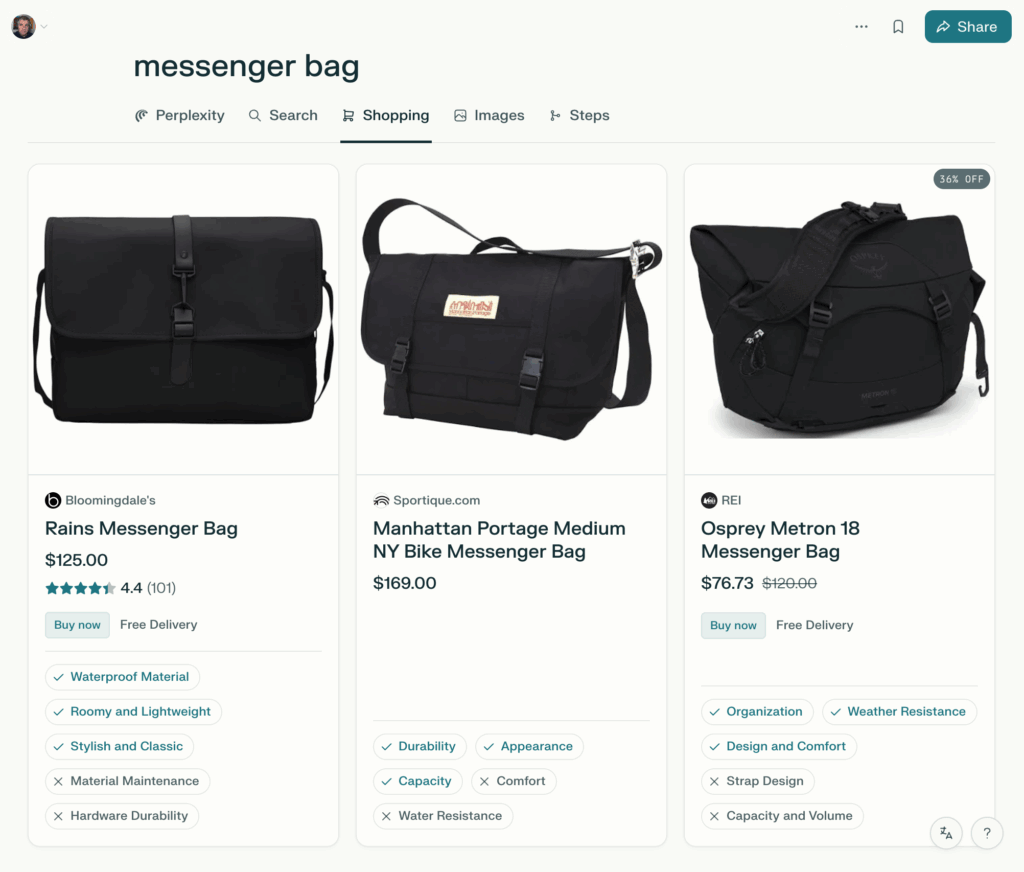
But then, also on instinct rather than being led by the platform, I clicked the “Shopping” tab on that page, and it took me to a different shopping experience—one with ads on the top, where each item had a lot of tagged features and large photos. When I clicked on a product, a low-information modal popped up.
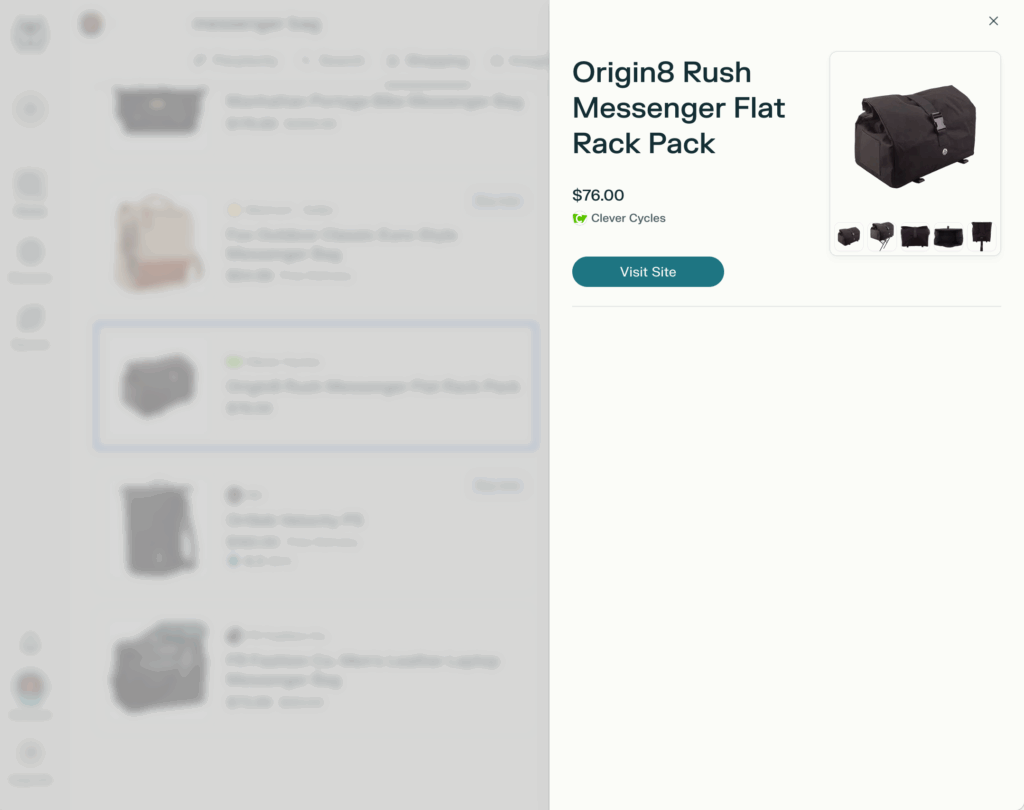
Anthropic’s Claude via their MacOS desktop app took about 10 seconds as well, and produced recommendations much like those in the first Perplexity search, without the specific instructions at the end. Nothing surprising here.
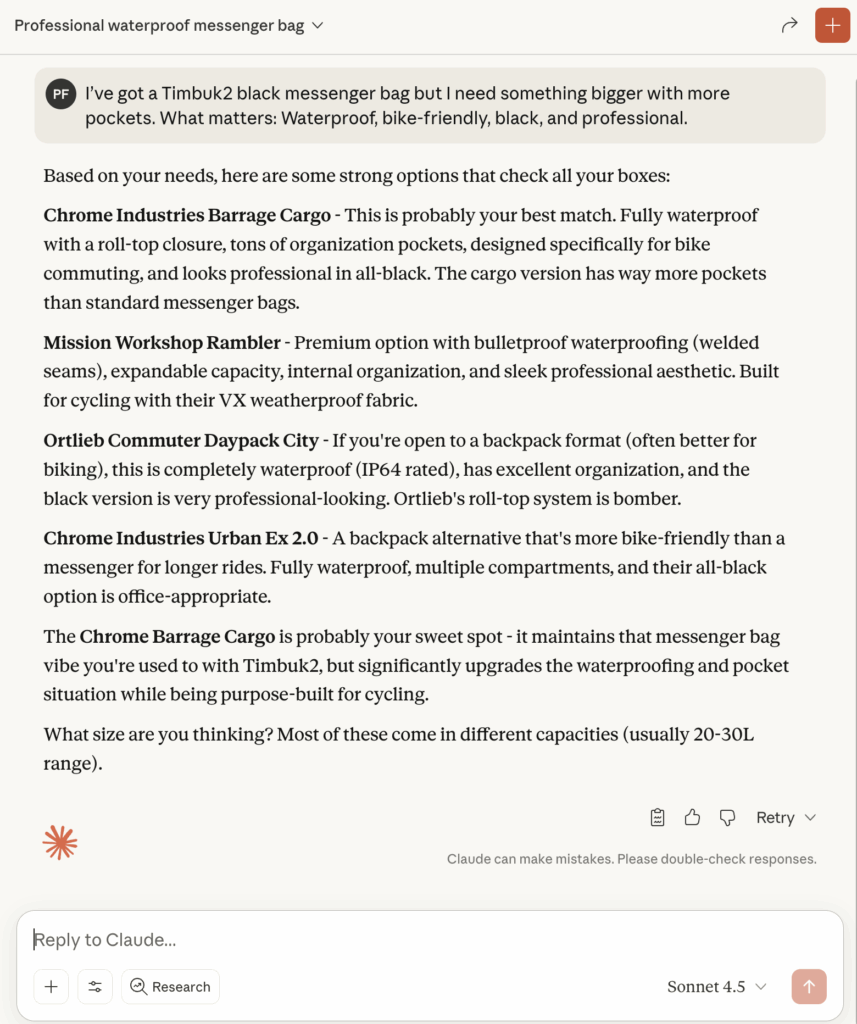
Finally, Google “AI Mode” via Safari on MacOS was most similar to the ChatGPT experience, but it was far better. First, it took around three seconds for the first results to appear, and six seconds to complete, and during that time it told me it was doing six searches reviewing more than 100 web pages. This went by so fast that I ended up recording a video just to replay what was happening. Close to immediately, it produced a variety of outputs: Narrative text, a table showing different bag features, some ads on the top right, and a complete shopping module per bag that featured product rankings, multiple stores, stock information, customer reviews, Reddit forum links, and related bags with discounts.
Who’s the Winner?
We can disqualify Claude because it isn’t funneling me to a commerce experience. Fair enough—maybe that’s a feature more than a bug. I’ll also disqualify Perplexity for offering multiple experiences, none of which make much sense. If I enter a prompt with clear intent to purchase, I’d expect a company to fall all over itself funneling me into a high-value comparison shopping experience. Perplexity seems like it wanted to do that, once, but forgot to get back to it.
ChatGPT is a very good experience at first, but it’s slow, and offers very little in the way of, well, hustle. It’s a concierge experience: It guides you to the products, offers thoughtful counsel, and then gets out of your way to let you make the right decision for you.
This is exactly what everyone says they want in a shopping experience, but I don’t believe that. People rely on Wirecutter because it’s human to a fault; people buy off Instagram ads because they like a hot girl’s bracelet and want to feel hot; people purchase Apple products because they saw the keynote and want the thing now; people spend six hours watching YouTube videos comparing $10 iOS productivity apps that they’ll use to run their lives, then, an hour later, spend that much on parmesan french fries that they eat with their fingers in three minutes.
Google knows all of this: They’re gonna jam the whole of commerce right down your gullet. You’ll get concierge service, a custom report, ratings, Reddit links, plus ads, links to stores, and real-time bargains thrown at you while your greedy, french-fry-grease-coated little index finger twitches over the buy button.
To sum up: ChatGPT has a pleasant shopping experience, but Google’s commerce product actually does hustle. It offers far more data about items, gives you real-time discounts on competing products, and generates custom shopping experiences in a few seconds—25x faster than ChatGPT. And it does all this entirely for free. OpenAI is like visiting a high-end suburban mall on a rainy weekday afternoon; in contrast, Google’s AI mode is like going to the NYC Herald Square Macy’s on Free Cocaine Day.
While Google does allow you to keep “talking” about the things you want to buy, this is ultimately a search product, not a chat product. It maps well to how people like to shop online, and it’s free. Google has product data, everyone already hews to their schemas, they already know everything about everyone’s shopping intention, they have their own LLMs, and they have the entire web archived—a globe-spanning filesystem, complete geodata, self-driving cars, and the ad industry runs through them. They’re good at this, they have a moat, and they understand consumers.
Amazon will compete on its own turf, but its shopping product is a depressing nightmare and they’ll use AI to make it even worse, as will their drop-shipping remoras. Facebook will doubtless jam AI into Marketplace, but Meta right now is basically a holding company for their chat products. At least OpenAI, for all their various horrors, is swinging big, and they can spider the same data Google has—but while their LLMs might be the best, they are severely behind.
The one that could really do something interesting in LLM-assisted commerce is Shopify, and…yep, lo and behold, they are partnered with OpenAI, too. Personally, if I was Shopify, I would be working on a whole world of shopping experiences powered by LLMs that wouldn’t give OpenAI access to my data, but we’ll see. They’re a weird one.
For the rest of us, way downstream from the giants—now what? Well, I think if you’re hosted on Shopify, for example, or have an Etsy store, you’re going to get a lot for free—they’ll make sure your product information goes into the big databases in an orderly way, using lots of linked data. That’s a huge reason to use those platforms. More broadly, the conversations people are having around “Generative Engine Optimization” (vs. SEO) are extremely relevant; the way we publish and share information is changing rapidly.
If I wanted to differentiate my products online, beyond what I get from Etsy or Shopify, I would sit down and think hard about how to use LLMs to summarize and republish my data in novel ways. For example, this seems silly, but if I sold messenger bags, maybe I’d get an LLM to make a list of the kinds of things that would fit inside different bags—people are going to search for products in all kinds of narrative ways. “A black bike bag that can hold shoes,” or, “A bag that’s good for a weekend.”
I’d explore ways to turn my language into data (to enhance the search experience) and turn my data into language (to feed the LLMs). I might give my customers $5 coupons if they tell me one weird thing they’ve used their bag for, then make sure that their responses were public, so my messenger bags would show up in incredibly unique queries.
I also think this moment is an interesting inflection point. All the other applications of AI—research assistant, appointment scheduler, software developer, document summarizer—are little tiny babies compared to the world of digital commerce. As this world of AI-enhanced, platform-driven e-commerce unlocks, I expect a lot of the other applications to become less and less a topic of conversation. Shopping is how you can justify those trillions in investment. It’s going to be a wild ride.
To me, these new moves into commerce point to a future where AI is not the main event, but an enabling technology—and the rest of the web stack, which has been badly ignored, will come back into focus. Things truly have changed, and they’ve also remained the same. As always.


